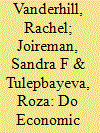| Srl | Item |
| 1 |
ID:
172875


|
|
|
|
|
| Summary/Abstract |
Kazakhstan has followed a foreign policy of multivector diplomacy since its independence from the former Soviet Union. While multivectorism was a strategy of necessity in its early years, it has evolved to empower Kazakhstan to effectively protect its independence and negotiate its relationship with the great powers on its borders and further afield. After the 2014 Russian seizure of Crimea it is noteworthy that Kazakhstan has maintained positive relations with Russia while asserting its sovereignty and independent foreign policy. In this article we investigate how Kazakhstan has negotiated the rise of China, taking advantage of the economic opportunities it presents. We trace the foreign policy of Kazakhstan from independence forward, examining its relationships with its Great Power neighbours and its role in international organizations and negotiations. We posit that multivectorism is similar to the strategy of omni-enmeshment and complex balancing seen in south-east Asia. Both are effective methods for secondary powers to protect their sovereignty and to coexist with Great Powers without becoming their client states. Kazakhstan's approach to foreign policy is an exemplar for secondary states. This article contributes to the literature on the strategic decision-making of secondary powers and to the theoretical analysis of the foreign policy of Kazakhstan during a critical moment of transition from the long-time rule of Nursultan Nazarbayev to the presidency of Kassym-Jomart Tokayev.
|
|
|
|
|
|
|
|
|
|
|
|
|
|
|
|
| 2 |
ID:
165345


|
|
|
|
|
| Summary/Abstract |
Foreign direct investment (FDI) can deliver benefits beyond the provision of capital, such as efficiency gains. We argue that the theorised positive effects of economic linkage are reduced when linkages are based on natural resources. Domestic elite coalitions supporting reform are also weaker in countries with extensive natural resources. Kazakhstan and Azerbaijan have high-value natural resources and significant FDI, making them most likely cases for reform. Kyrgyzstan is a contrasting case as it has few natural resources. We find that the institutional reforms we would anticipate because of linkages have not occurred and those that exist are often cosmetic.
|
|
|
|
|
|
|
|
|
|
|
|
|
|
|
|
| 3 |
ID:
085514


|
|
|
|
|
| Publication |
2008.
|
| Summary/Abstract |
The majority of the literature examining the European Union's ability to encourage political and economic reform only considers its influence in countries involved in the accession process; few have examined its impact in non -accession countries. Therefore in this paper I assess the ability of the EU to promote reform outside of the accession process and develop a theory explaining a state's compliance with or rejection of EU pressure to reform. Through comparing and contrasting the cases of Belarus and Ukraine, I determine that a combination of domestic elite preferences and the strength of EU pressure - a function of the degree of unity among the EU members on the issue - influence the likelihood of a state's c
|
|
|
|
|
|
|
|
|
|
|
|
|
|
|
|
| 4 |
ID:
128249


|
|
|
|
|
| Publication |
2014.
|
| Summary/Abstract |
Although scholars have made great progress over the last few years studying the international dimension of democratisation, questions remain about this complex relationship, especially about the understudied area of external promotion of authoritarianism. This article seeks to develop more refined understanding of specific mechanisms linking one type of external involvement, financial assistance, to regime change. Financial assistance can increase the capabilities of either pro-democratic or pro-authoritarian elites and therefore contribute to regime change. These mechanisms are examined by looking at democracy assistance in Slovakia and Belarus and Russia's support for authoritarianism in Belarus.
|
|
|
|
|
|
|
|
|
|
|
|
|
|
|
|
| 5 |
ID:
186719


|
|
|
|
|
| Summary/Abstract |
Political science courses often address difficult topics that can take an emotional and psychological toll on students, including burnout, compassion fatigue, and vicarious traumatization. There is a growing awareness of the importance of reflective and self-care practices in teaching, especially considering the consequences of the COVID-19 pandemic on student mental health. However, this is a rarely discussed topic in political science. This article discusses the results of our pedagogical research on the emotional impact of learning about atrocities, the challenges of studying during a global pandemic, and the benefits of self-care activities (e.g., meditation) for student well-being. Our research is based on two different courses and includes student self-reflections and our analysis of class discussions. We conclude that our students struggle with the emotional costs of studying difficult topics (especially during the pandemic) and are receptive to doing self-care activities and find them beneficial for their mental health.
|
|
|
|
|
|
|
|
|
|
|
|
|
|
|
|